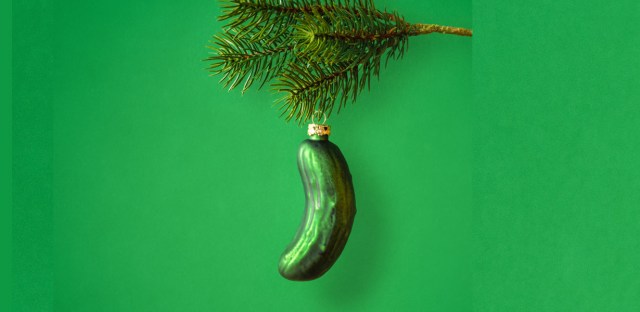Here’s what it means when you see a pickle ornament on a Christmas tree—and why you’ll want to add one to your own tree this year
Have you ever noticed something unique hanging on a friend or family member’s Christmas tree? For some families, hanging a glass pickle (usually tucked inside the tree’s branches so it’s a bit hidden from plain view) is part of a fun tradition. But what does a pickle ornament mean, and where does this tradition come from?
Spotting the pickle ornament on your family’s Christmas tree is supposed to be a sign of good luck. The tradition has a few different variations, but typically, the first child to find the pickle on the tree will have a fortuitous next year—and may get a prize or extra present, get to open the first present, or get to hand out presents to the rest of the family.
The custom is known as Weihnachtsgurke, which is German for “Christmas pickle.” That seems to point to pickle ornaments having German roots, but the origins of this tradition are actually a lot less clear-cut than that. In fact, YouGov polled 2,057 German people and found that 91 percent of them had never even heard of the Christmas pickle tradition.
The New York Times has reported that pickle ornaments are a common tradition in the Midwest (which I can confirm—many of my midwestern friends have celebrated this tradition for their entire lives). There’s even an annual Christmas Pickle Festival in the German settlement of Berrien Springs, Michigan.
The true origins of the pickle ornament tradition will probably remain a mystery, though. Some say it began with a story of a villanous innkeeper who trapped two boys in a pickle barrel, until they were rescued by Santa Claus. Another story says a German immigrant was captured as a soldier during the civil war, and he begged for a pickle, which magically sustained him until he could escape.
No matter the reason for the tradition, adding a hidden pickle ornament to your family tree can add some fun (and a little friendly competition) to the holidays. Happy pickle hunting!
